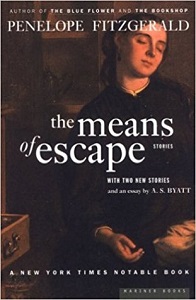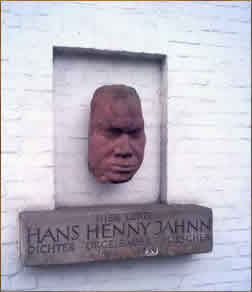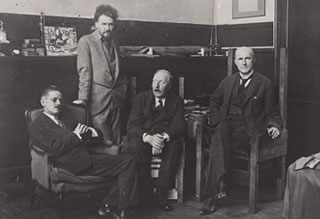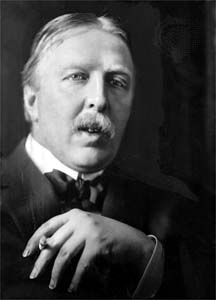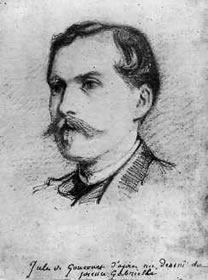De Nederlandse schrijver Ronald Giphart werd geboren op 17 december 1965 in Dordrecht. Zie ook alle tags voor Ronald Giphart op dit blog.
Uit: Heiß (Vertaald door Judith Dörries)
“Die Welt ist für mich ein Großhandel voller Zutaten, ein unerschöpfliches Rezeptbuch. Es ist ganz einfach: Wenn ich aufstehe, habe ich Hunger, und wenn ich abends ins Bett gehe, überlege ich, was ich am nächsten Tag zubereiten könnte. Ich bringe alles mit Essen in Verbindung. Zu allem fallen mir spontan Gerichte ein. Laufen drei Frauen auf der Straße, dann sehe ich bei der ersten sofort ein zartes Wildgericht, bei der mittleren einen marinierten Stint und bei der dritten eine raffinierte Suppe aus Rüben, Tee und Krabben. Das klingt nach einer schwachsinnigen Kombination für eine Suppe, aber ich habe damit Furore gemacht.”
(…)
Lecker? LECKER? Was ich meine Lippen passieren lasse, muss ausnahmslos vorzüglich sein, pur und erhebend. Ich will einen doppelten Regenbogen hinter den Zähnen, den Gaumen mit einem perfekt abgestimmten Geschmacksteppich bombardieren, die Speiseröhre überrumpeln und den Magen in einen der höchsten Zustände von Befriedigung versetzen, für weniger mache ich es nicht. Ich glaube nicht an einen Schöpfer oder eine höhere Macht, aber ich möchte bei allem, was ich esse, dankbar für die Existenz des Lebens selbst sein. Das klingt dick aufgetragen, und so ist es auch gemeint. Ich will dick auftragen, wenn ich von meinem Beruf spreche. Wenn nicht Köche über das Kochen dick auftragen dürfen, wer dann?“

Ronald Giphart (Dordrecht, 17 december 1965)
De Nederlandse schrijfster Yvonne Keuls werd geboren op 17 december 1931 in Batavia, toen nog een onderdeel van Nederlands Indië. Zie ook alle tags voor Yvonne Keuls op dit blog.
Uit: De tocht van het kind
“Angela’s voorstelling van Holland was voornamelijk gebaseerd op de foto van tante Toetie en oom Kakkie – tot aan hun fontanel in het bont gestoken – die stijfjes voor een brugleuning stonden (haar moeder Elis zei dramatisch dat ze daaraan waren vastgevroren en dat het vóór oom Kakkies ziekte was) en op een foto van oom Etjen, tante Dodot en hun meisjes in Volendams kostuum. Ze zaten dicht bijeen in een roeibootje, tante Dodot met haar armen om een mand vol eieren (de angst dat ze die zou laten vallen was op haar gezicht te lezen) en oom Etjen, die gewend was kreteks te roken, ongemakkelijk zuigend op de lange steel van een witte, stenen pijp. Op het achterdoek was een Hollands landschap geschilderd, met koeien, een molen en een molenaar. De laatste, eveneens zuigend op een lange, stenen pijp, stond wijdbeens voor een gesloten deur.
Geen moment vroeg Angela zich af waarom haar familie zich zo wonderlijk had uitgedost, wel verbaasde haar die zware, gesloten voordeur. Ze liet zich vele malen uitleggen dat de huizen in Holland geen open voorgalerijen hadden, maar deuren die op slot gingen, zelfs op het nachtslot.
Angela – wist wat een nachtbloem was. Dat was een bloem die ’s nachts openging. En dus vroeg ze:
‘Gaat dat nachtslot ’s nachts ook open, mammie?’
‘Nee, natuurlijk niet,’ zei Elis, ‘juist dicht. Overdag, als je naar binnen wilt, moet je bellen en dan wordt er opengedaan door de meid.’
‘Wat is dat, de meid?’
‘De meid is een witte baboe.’
‘En brengt de witte baboe je naar bed? En blijft ze bij je zitten tot je slaapt?’
‘Ach nee, in Holland is alles anders.’
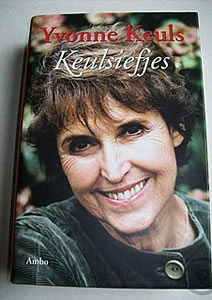
Yvonne Keuls (Batavia, 17 december 1931)
De IJslandse schrijver Jón Kalman Stefánsson werd geboren in Reykjavík op 17 december 1963. Zie ook alle tags voor Jón Kalman Stefánsson op dit blog.
Uit: Himmel und Hölle (Vertaald door Karl-Ludwig Wetzig)
“Die Berge überragen Leben und Tod und die paar Häuser, die sich auf
der Landzunge zusammendrängen. Wir leben auf dem Grund einer Schüssel, der Tag geht vorüber, es wird Abend, die Schüssel läuft langsam voll Dunkelheit, und dann leuchten die Sterne auf. Ewig blinken sie über uns, als hätten sie eine wichtige Botschaft, aber welche und für wen? Was wollen sie von uns, oder vielleicht eher noch: was wollen wir von ihnen?
Wir haben heute nur noch wenig an uns, das an Licht erinnert. Der Dunkelheit stehen wir viel näher, sind selbst fast Dunkelheit. Das Einzige, was wir noch haben, sind die Erinnerungen und außerdem die Hoffnung, die allerdings schwächer geworden ist, sie nimmt immer noch weiter ab und wird bald einem erkalteten Stern gleichen, einem dunklen Felsbrocken. Immerhin wissen wir ein wenig vom Leben und ein wenig vom Tod, und wir können berichten: Wir haben den ganzen Weg zurückgelegt, um dich zu packen und um das Schicksal zu bewegen.
Wir wollen von denen erzählen, die in unseren Tagen gelebt haben, vor mehr als hundert Jahren, und die für dich kaum mehr sind als Namen auf schiefen Kreuzen und geborstenen Grabsteinen. Leben und Erinnerungen, die nach dem unerbittlichen Gesetz der Zeit ausgelöscht wurden. Genau das wollen wir ändern. Unsere Worte sind eine Art Lebensretter in unermüdlichem Einsatz, sie müssen vergangene Geschehnisse und erloschene Leben dem Schwarzen Loch des Vergessens entreißen, was keine geringe Aufgabe ist. Gern dürfen sie unterwegs ein paar Antworten finden und uns hier wegholen, ehe es zu spät ist. Aber lassen wir’s vorerst dabei, wir schicken die Worte an dich weiter, diese ratlosen, zerstreuten Lebensretter, die sich ihres Auftrags gar nicht sicher sind – sämtliche Kompasse spielen verrückt, Landkarten sind zerfleddert oder veraltet –, aber nimm sie trotzdem in Empfang. Und dann sehen wir, was passiert.”
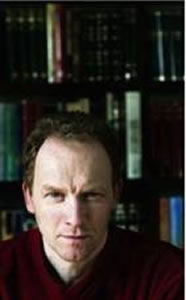
Jón Kalman Stefánsson (Reykjavík, 17 december 1963)
De Antilliaanse dichter en schrijver Frank Martinus Arion werd geboren op 17 december 1936 op Curaçao. Frank Martinus Arion overleed op 27 september jongstleden. Zie ook alle tags voor Frank Martinus Arion op dit blog.
Uit: Helman, de eenzame jager
„Die eenzaamheid is belangrijk. En op gevaar af van u te vermoeien een klein beetje, moet ik haar op haar ware niveau brengen. Ik bedoel, we moeten even de ladder op, ik kan er ook niets aan doen. Want die eenzaamheid heeft nog meer aspecten dan ik al genoemd heb. En om Helman in z’n totaliteit te begrijpen lijkt me dat ik u deze aspecten als achtergrond moet geven.
Er is een literair-historisch aspect, waar ik zo op kom. Er is een marxistisch aspect, er is een psycho-analytisch aspect, een existentialistisch aspect, een kolonialistisch aspect, en wat ik zelf zo maar noem, een familiaal aspect, kortom, een heleboel ‘ismes’ die we nodig hebben om wat brighter spotlight op de grondideeën te brengen. Ik begin eerst met het marxistische aspect. We weten van de tijdgenoten van Helman, dat hij in z’n eerste tijd in Europa ontzettend veel, voor z’n vrienden tot vervelens toe, Marx las en Freud. Slauerhoff schreef: ‘Die man gaat kapot aan Freud en Marx.’ Dat ma
rxistische aspect heeft te maken met het marxistische begrip vervreemding4. Die desintegratie die in maatschappijen optreedt heeft Marx ‘vervreemding’ genoemd en hij heeft het beschreven, en hij heeft er de oorzaak van aangegeven. Ik zal het in heel eenvoudige termen proberen weer te geven:
Marx zegt dat vroeger, vóór het kapitalisme, de mensen in een harmonieuzere situatie met elkaar leefden. Waarom? Omdat hun betrekkingen met de spullen anders waren. De mensen wilden dingen bezitten, maar het was in de eerste plaats om er van te genieten, zelf. De ene man maakte schoenen, en die ruilde dat voor groente, en de ander maakte een ander product en ruilde dat weer tegen een ander product. De bedoeling was niet spullen op te potten, de bedoeling was geen géld, de bedoeling was geen verrijking! Dat is de paradijselijke situatie die we misschien nog bij Indianen vinden. Ook hier. In die situatie is door het kapitalisme verandering gekomen, omdat men niet meer de spullen zoekt om hun gebruikswaarde, zoals de term luidt, maar men zoekt de spullen om hun verkoopwaarde, of om hun ruilwaarde. En dat is erg, omdat dat ook op de menselijke betrekkingen een rol gaat spelen. Marx zegt: de koopman heeft geen aandacht meer voor de schoonheid van mineralen, hij heeft alleen maar aandacht voor de verkoopwaarde van mineralen. Alle andere zintuigen, zegt Marx, worden op de achtergrond gedrukt, en er komt een nieuw zintuig naar voren, het zintuig van het Hebben. Dat creëert een gemeenschap, zoals ik daarnet zei, waarin ook de menselijke waarden niet meer zuiver zijn. De mensen gaan met elkaar om merendeels omdat ze elkaar nodig hebben als steppingstone om dingen te bereiken. Ze gaan niet meer naar recepties omdat ze het leuk vinden elkaar te ontmoeten en te begroeten, maar om elkaar te spreken om iets te ‘regelen’ zoals we dat hier zo treffend zeggen.”

Frank Martinus Arion (Curaçao, 17 december 1936)
De Duitse schrijver Hans Henny Jahnn werd geboren op 17 december 1894 in Hamburg.Zie ook alle tags voor Hans Henny Jahn op dit blog.
Uit: Die Geschichte der beiden Zwilinge
“Es wurden zwei Knaben als Zwillinge geboren. Schnell nach einander verliessen sie den Schoss der Mutter Und es erwies sich, sie waren einander ähnlicher als sonst zwei Dinge gleicher Form… Sie hatten unähnliche Namen erhalte
n. Die Namen hatten nicht vermocht, sie von einander zu trennen. Ihr Körper hatte nur ein Ziel, dem anderen nachzueifern in der Gestalt…Die gleichen Sterne regierten ihr Schicksal. Erkrankte der eine, so konnte der andere nicht mehr wet vom Krankenlager sein….Auf der Strasse wurden sie mit ihrem unrichtigen Namen angesprochen. Sie fanden sich darein, jeder, auch auf den Namen des anderen zu hören. Ein verwegener Mensch redete sie eines Tages an und fragte, ob denn sie beide nicht sich vertauschten. Es war die schlimmste Frage, die bis dahin an ihnen gestellt worden war. Sie bedachten sich. Sie wogen sich im Geiste. Sie wechselten ihre Plätze, blickten sich an und antworteten wie im Schlaf: Sie selbst wissen es nicht…Sie erregten sich über den unklaren Zustand, in dem sie sich befanden, und versuchten sich voneinander zu halten…Aus ihrem Selbst wurde das Du. Ihr Bewusstsein plätscherte mehrmals hin und zurück. Bis sie die Erinnerung an den Namen des Ich verloren hatten. .. Heimlich erwogen sie, der eine müsse den anderen töten.“
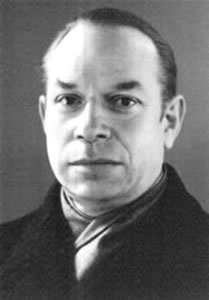
Hans Henny Jahnn (17 december 1894 – 29 november 1959)
De Engelse dichter, schrijver en publicist Ford Madox Ford werd geboren op 17 december 1873 in Merton, Surrey. Zie ook alle tags voor Ford Madox Ford op dit blog.
Finchley Road
As we come up at Baker Street
Where tubes and trains and ‘buses meet
There’s a touch of fog and a touch of sleet;
And we go on up Hampstead way
Towards the closing in of day . . .
You should be a queen or a duchess rather,
Reigning in place of a warlike father
In peaceful times o’er a tiny town
Where all the roads wind up and down
From your little palace – a small, old place
Where every soul should know your face
And bless your coming. That’s what I mean,
A small grand-duchess, no distant queen,
Lost in a great land, sitting alone
In a marble palace upon a throne.
And you’d say to your shipmen: ‘Now take your ease,
Tomorrow is time enough for the seas.’
And you’d set your bondmen a milder rule
And let the children loose from the school.
No wrongs to right and no sores to fester,
In your small, great hall ‘neath a firelit dais,
You’d sit with me at your feet, your jester,
Stroking your shoes where the seed pearls glisten
And talking my fancies. And you as your way is,
Would sometimes heed and at times not listen,
But sit at your sewing and look at the brands
And sometimes reach me one of your hands,
Or bid me write you a little ode,
Part quaint, part sad, part serious . . .
But here we are in the Finchley Road
With a drizzling rain and a skidding ‘bus
And the twilight settling down on us.

Ford Madox Ford (17 december 1873 – 26 juni 1939)
De Franse schrijver Jules de Goncourt werd geboren op 17 december 1830 in Parijs. Zie ook alle tags voor Jules de Goncourt op dit blog.
Uit: Les Hommes De Lettres
“Un article ?… Tu me demandes s’il y a un article dans mon histoire ? Mais, malheureux, un enfant de six ans en ferait une comédie en vers, les yeux bandés! Scène première : le foyer de la Comédie-Française… tu comprends… la maison de Molière… Talma… les souvenirs… la tirade : c’est là où César cause avec Scapin, où Melpomène prend l’éventail de Thalie, où…, où…, où… il n’y a pas de raison pour que ça finisse! Tu passes aux indiscrétions : Provost et Anselme qui jouent aux échecs, l’ingénue qui demande une glace, l’huissier qui fait découvrir le grand-duc héréditaire de Toscane, et mademoiselle Fix qui le fait rougir de ne s’être point découvert de lui-même, la Société du rachat des captifs…
– Hein! la société…?
– Tu ne la connais pas ? C’est pourtant une société secrète… Devine ce qu’il y a dans le foyer de la Comédie!… Il y a des poulpes! C’est terrible! Une fois accroché, c’est fini! ils vous entraînent au fond de leur conversation. Voilà, je suppose, un homme ou une femme, les poulpes n’y regardent pas, Got, si tu veux, ou mademoiselle Ricquier, pincés par Frappart ou par M. Benett, l’auteur anglais… très bien! Un membre de la Société accourt : Pardon! j’aurais un mot à vous dire… – Sauvé, mon Dieu! dit l’autre… Et voilà ce que c’est que la Société du rachat des captifs!… Si tu ne fais pas cinquante lignes avec ça… Et puis il y a des tableaux du foyer…
– Après ?
– Après ? après, tu poses ta femme : une comédienne célèbre… Tu ne la nommes pas… tu dis seulement : Notre Célimène… ça ne compromet personne!… Notre Célimène passait les mains dans les cheveux d’un grand poète… Ici l’initiale du poète… Il faut toujours nommer un poète, sans ça on peut le confondre avec un homme qui fait des vers… Et tu entames le dialogue : «O mon poète! – fait la Célimène, – pourquoi ne faites-vous plus de ces charmantes comédies comme vous seul savez en faire ?… Pour un rôle de vous où j’aurais quinze ans, je donnerais dix ans de ma vie!…» Ici tu peux lâcher le mot : Célimène, vous y auriez gagné!… et tu passes au poète. Le poète a dîné ; il a ronflé pendant une heure tout seul dans une loge de huit places ; il est bu, mais bu… il ferait un poème épique, et il parle nègre! Fais-le parler nègre, le public adore ça, ça lui rappelle Paul et Virginie! – «Moi… pièce ? moi… comédie ? travailler ?… pas d’intérieur!… impossible!. sale… rien trouver… brosses à dent partout!… travailler!… trop sale!… – Mais si quelqu’un vous installait dans un joli petit appartement bien rangé ? – Oh! divin… pas de peignes sur les meubles… intérieur… plumes taillées… une pièce!… deux pièces!… trois pièces!… toujours!
„
Jules de Goncourt (17 december 1830 – 20 juni 1870
De Engelse dichteres, schrijfster en essayiste Penelope Fitzgerald werd geboren op 17 december 1916 in Lincoln. Zie ook alle tags voor Penelope Fitzgerald op dit blog.
Uit: Human Voices
„Inside Broadcasting House, the Department of Recorded Programmes was sometimes called the Seraglio, because its Director found that he could work better when surrounded by young women. This in itself was an understandable habit and quite harmless, or, to be more accurate, RPD never considered whether it was harmless or not. If he was to think about such things, his attention had to be specially drawn to them. Meanwhile it was understood by the girls that he might have an overwhelming need to confide his troubles in one of them, or perhaps all of them, but never in two of them at once, during the three wartime shifts in every twenty-four hours. This, too, might possibly suggest the arrangements of a seraglio, but it would have been quite unfair to deduce, as some of the Old Servants of the Corporation occasionally did, that the RP Junior Temporary Assistants had no other duties. On the contrary, they were in anxious charge of the five thousand recordings in use every week. Those which the Department processed went into the Sound Archives of the war, while the scrap was silent for ever.
‘I can’t see what good it would be if Mr Brooks did talk to me,’ said Lise, who had only been recruited three days earlier, ‘I don’t know anything.’
Vi replied that it was hard on those in positions of responsibility, like RPD, if they didn’t drink, and didn’t go to confession.
‘Are you a Catholic then?’
‘No, but I’ve heard people say that.’
Vi herself had only been at BH for six months, but since she was getting on for nineteen she was frequently asked to explain things to those who knew even less.
‘I daresay you’ve got itwrong,’ she added, being patient with Lise, who was pretty, but shapeless, crumpled and depressed. ‘He won’t jump on you, it’s only a matter of listening.’
‘Hasn’t he got a secretary?’
‘Yes, Mrs Milne, but she’s an Old Servant.’
Even after three days, Lise could understand this.
‘Or a wife? Isn’t he married?’
‘Of course he’s married. He lives in Streatham, he has a nice home on Streatham Common. He doesn’t get back there much, none of the higher grades do. It’s non-stop for them, it seems.’
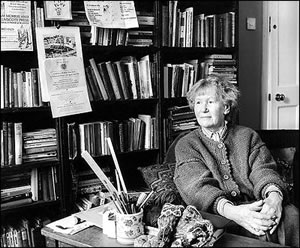
Penelope Fitzgerald (17 december 1916 – 28 april 2000)
De Franse schrijver Alphonse Boudard werd geboren op 17 december 1925 in Parijs. Zie ook mijn blog van 17 december 2008.
Uit: Les combattants du petit bonheur
„Ça faisait maintenant six mois quej’étais branché avec la Résistance. Le grand moment de ma vie, je me figurais. Jusque-là, ça s’était poursuivi cahin nos salades de terrain vague, nos conciliabules, nos propos en l’air. On parlait de rejoindre les Anglais, ça nous semblait le remède de tous nos maux… la vie trop monotone, les restrictions, la dépendance des adultes, la chtourbe ! Tout nous paraissait beau une fois pris le large.J’essaie aujourd’hui de me revoir exact… maigre, boutonneux, va de la gueule… me comprendre. Si je vire le schéma de l’esbroufe, la légende qu’on entretient…j’aperçois, je perçois un zèbre difficile à saisir. Il m’emmerde plutôt de mon point de vue actuel. Il dit n’importe quoi… il se fait piéger… il risque de mourir pour rien du tout. La vie c’est pourtant sa seule richesse… les plaisirs à prendre, le bon air qu’on respire le jour où l’on sort d’une prison, d’un hôpital… le coup qu’on va boire quand il fait soif… la femme qui se déloque, qui s’offre… les courts instants de bonheur qui vous réconcilient avec l’existence toujours ! C’eût été vraiment trop bête, trop abominable de se faire étendre pour le droit d’être sur le monument aux morts, pour la gloire du Général, pour des lendemains qui doivent chanter et qui finissent par pleurer des larmes de sang.“
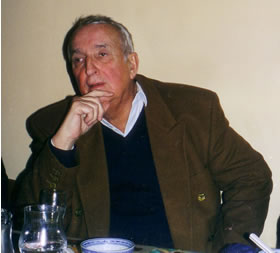
Alphonse Boudard (17 december 1925 – 14 januari 2000)
Zie voor onderstaande schrijvers ook mijn blog van 17 december 2008.
De Braziliaanseschrijver Érico Veríssimo werd geboren op 17 december 1905 in Rio Grande do Sul.
De Oostenrijkse schrijver Albert Drach werd op 17 december 1902 in Mödling geboren.
De Amerikaanse schrijver John Kennedy Toole werd geboren op 17 december 1937 in New Orleans.
De Amerikaanse dichter en hervormer John Greenleaf Whittier werd geboren in Haverhill, Massachusetts op 17 december 1807.
De Canadese schrijver Thomas Chandler Haliburton werd geboren op 17 december 1796 in Windsor, Nova Scotia.
De Poolse dichter en militair Władysław Broniewski werd geboren op 17 december 1897 in Plock.
